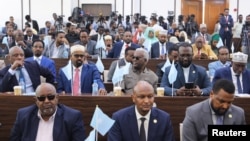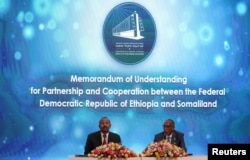The Somali government has strongly rejected a memorandum of understanding signed between Ethiopia and the self-declared region of Somaliland and recalled its ambassador in protest.
Following a cabinet meeting Tuesday in Mogadishu, the Somali government declared the deal "null and void" and "unacceptable."
"The Somali government recognizes Ethiopia's actions as a blatant violation of the sovereignty and territorial integrity of the Federal Republic of Somalia," read a statement issued at the end of the cabinet meeting.
"The Somali government, with the support of its people, is ready to defend, protect and preserve the sovereignty, dignity, territorial integrity, and social unity. In response to this matter, the Somali government recalls its ambassador to Ethiopia for urgent consultation."
The action by the Somali government came a day after Ethiopia announced Monday signing a "historic" initial agreement with the self-declared republic of Somaliland that will allow landlocked Ethiopia to have access to the Red Sea.
Ethiopia Prime Minister Abiy Ahmed signed the "memorandum of understanding" with Somaliland President Muse Bihi Abdi, who has been visiting Addis Ababa.
"The memorandum of understanding shall pave the way to realize the aspiration of Ethiopia to secure access to the sea and diversify its access to seaports," said a statement issued by Ahmed's office.
Somaliland further confirmed the details of the deal.
Abdi posted on X that in the memorandum Ethiopia "officially recognizes the Republic of Somaliland while Somaliland grants naval and commercial sea access on lease to Ethiopia for 50 years."
Somaliland Ministry of Foreign Affairs also posted that recognition marks a "significant diplomatic milestone for our country."
"It's crucial to note that the leased sea access underscores the cooperative spirit and strategic partnership established through this diplomatic accord," a statement by the ministry said.
Ethiopia has not yet confirmed it will recognize Somaliland but has welcomed the deal.
In a post on X, Redwan Hussien, Minister, National Security Advisor to Abiy Ahmed wrote: "A step ahead in the right direction."
Somalia warned Ethiopia against "any attempt to violate the sovereignty, independence, and unity of the Federal Republic of Somalia. This entitles the federal government of Somalia the right to respond to the provocative action taken by the federal government of Ethiopia in any means and legal process necessary."
Somalia appealed to the United Nations' Security Council, the AU or African Union, the Organization of Islamic Cooperation, the Arab League, IGAD and other partners to "unequivocally condemn Ethiopia's serious violations and force it to return to the confines of international laws."
"The federal government of Somalia views this action as an impediment to the neighborly relations, peaceful coexistence, and regional stability, and is a blatant assault on the independence, sovereignty, and unity of the Federal Republic of Somalia," the statement said.
President of Somalia Hassan Shekh Mohamud, who addressed a joint session of the parliament, vowed that Somalia will not allow "an inch of Somali territory to be taken away."
Citing Ethiopia's military intervention in 2006, a rallying cry for some Somalis who supported the al-Shabab militant group, Mohamud said the current Ethiopian prime minister's action is "creating an opportunity for al-Shabab to recruit."
Al-Shabab immediately responded to the deal and condemned the MoU signed between Ethiopia and Somaliland.
The group's official spokesman, Ali Mohamud Rage, "Ali Dheere," in an audio recording, said the deal is "unlawful" and "invalid." He criticized Somaliland leaders for signing the deal and has threatened to fight it.
Somalia and Ethiopia have a troubled history, having fought wars over territorial disputes. The last major war took place in 1977, when Somalia initially seized large parts of the Somali region in eastern Ethiopia, only for Ethiopia to regain control of the area in a counterattack.
Following the ousting of two military rulers in the space of months in 1991, relations between Ethiopia and Somalia have been improving. Ethiopia hosted reconciliation conferences for Somalia factions from 1993 until the federal government was formed in 2004 in neighboring Kenya. The leader of that government, former president Abdullahi Yusuf Ahmed, asked Ethiopia to send troops to support the federal government to fight Islamic courts and militants.
After a war, Ethiopia withdrew troops in 2009. Ethiopia sent its troops back into Somalia in early 2012 after militants expanded, and Ethiopian forces joined the AU peacekeeping mission in Somalia. Currently Ethiopia has thousands of troops in Somalia, some of whom serve as part of an AU mission, and some are stationed in various areas under a bilateral agreement.





